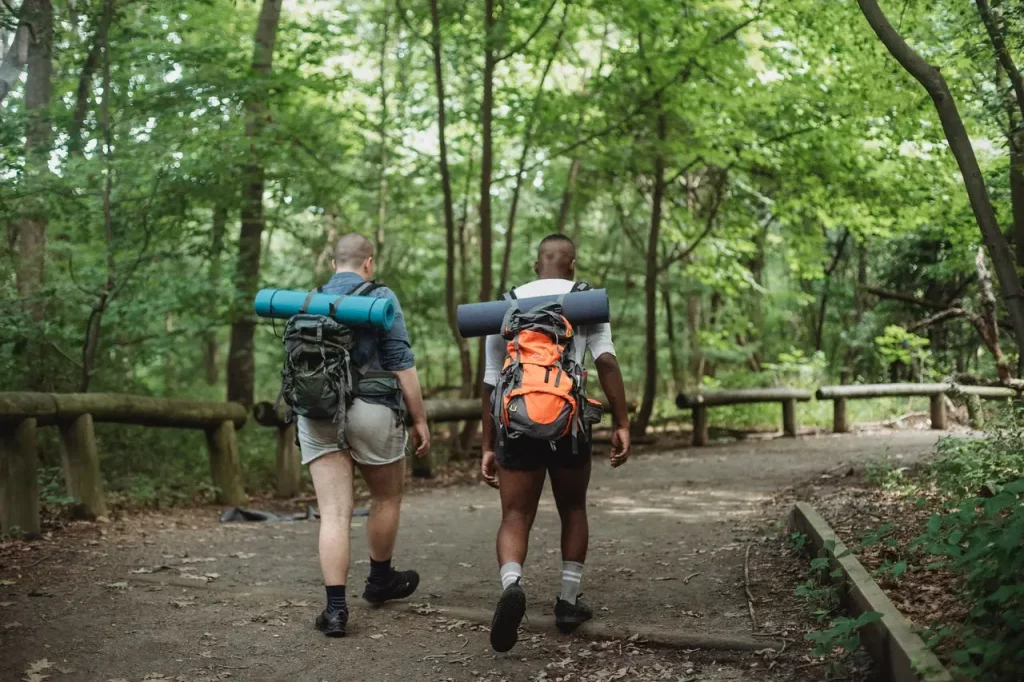Exploring nature with your four-legged family member can be a great way to bond while enjoying the great outdoors. While camping and hiking with your dog can be an incredibly rewarding experience, it’s important to remember that your dog is a part of the planning process. Here are some tips and tricks to make camping safe for your dog.
Get the proper supplies.
There are some must-haves when it comes to camping with your pup. First and foremost, bring along their regular food, water dishes, and enough food for however long you’ll be gone.
You may also want to bring their favorite toys or treats for when they get bored; this will ensure they’re entertained during downtime. If you plan on leaving your campsite for extended periods, consider bringing a portable kennel or crate so your pet can stay safe while you are away. This is especially useful if you plan on hiking without them; having them tucked away will prevent them from running off after wild animals or getting hurt while exploring without supervision.
It’s also important to bring along plenty of poop bags, as it is polite towards other campers. It will also help prevent wild animals from coming around looking for food if any remains are left behind. Lastly, bring insect repellent just in case – mosquitoes love dogs as much as humans do!
If you’re looking to get these supplies while on a budget, it might be best to shop for them online, as online stores usually have a comprehensive selection of cheap dog supplies. You can also look at reviews and compare products more easily online.
Put an ID tag on their collar.
An ID tag on your dog’s collar is essential when camping because it helps identify your dog in case they get lost. The tag should include name, age, breed, and contact information for you and a trusted family member or friend—so that anyone who finds them can easily contact you.
When selecting a collar for your dog, pick one that fits comfortably but securely—you want to be sure that it won’t slip off if they jump into a lake or get caught on something in the woods. The same goes for their ID tag; make sure it’s secure enough so that it won’t come off if they are running around on the trails or playing in the water. A stainless steel or other durable material is ideal for the collar and the tag.
In addition to having an ID tag, consider microchipping your dog as well. This involves implanting a tiny chip under their skin that includes all their and your vital information. If someone finds your pet without a collar or tag (which can happen if they manage to wiggle out of their collar), a microchip can help reunite them quickly with you!
Keep them close.
When camping with your dog, it’s important to keep them close by. Not only does this provide safety for you and your pet, but it gives you peace of mind that they won’t get lost or wander off into trouble. Make sure to always keep their leash handy in case your dog gets overly excited or wants to explore an area that isn’t safe. You can even try letting them wear a backpack when out on a hike, so they feel part of the action.
The great outdoors can be unpredictable, so it’s important to be prepared for anything when camping with your dog. When out exploring, bring plenty of water for yourself and your pet. On hotter days, they’ll need it more than you. Also, maybe carry around some food and treats just in case you get stranded or find yourselves further away from home than expected.
In addition, consider bringing along any necessary medications or first aid supplies if something goes wrong while exploring the wilderness. When camping with a dog, it’s important to check the area before allowing them off-leash. Be aware of potential dangers, such as ticks, snakes, wild animals, and poisonous plants, that could put them at risk of harm or illness. Some areas may even have restrictions on where dogs are allowed; be sure to research ahead of time, so you know what regulations you must abide by during your trip.

Take them to the vet first.
You must take your dog to the vet before you leave for your camping trip. Ensure their vaccinations are up-to-date and that they have been given any necessary flea/tick prevention medication. This will help protect them from potential parasites and diseases that can be found in nature. Also, make sure that your dog has had a full physical exam before leaving so that any underlying health conditions can be addressed before embarking on an outdoor adventure.
Camping with any four-legged friend is an incredible way to connect with nature while deepening your relationship with your furry animal. The key is being prepared. Once everything is taken care of, simply enjoy spending time outdoors surrounded by natural beauty alongside one or more of your best friends!

